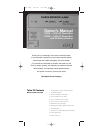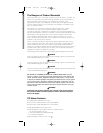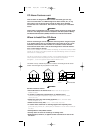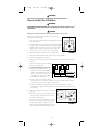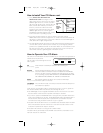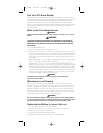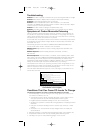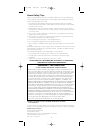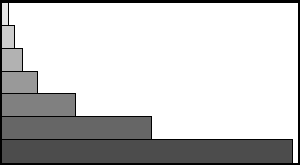
7
Troubleshooting
Problem: The alarm is properly connected to AC power, but the green LEDs do not light.
Solution: Return alarm to Maple Chase Company for service (see warranty).
Problem: Amber Fault light flashes every 30 seconds
Solution: Press the Test/Reset button to allow the alarm to re-check itself
internally. If the AMBER LED continues to flash, the alarm must be returned to Maple
Chase Company for service (see warranty).
Problem: The alarm makes a chirping sound (Model COQ6 only).
Solution: The battery needs to be replaced (see “How to Operate Your CO Alarm”).
Symptoms of Carbon Monoxide Poisoning
Carbon monoxide poisoning has many symptoms. However, some symptoms are
very similar to flu symptoms, the effects of intoxication, or drug usage. In many CO
cases, people feel ill and stay home to rest. This only compounds the CO poisoning
because they stay in the home where CO is present.
As CO levels rise, the symptoms become more extreme. At low levels people will suf-
fer headaches and mild nausea. At higher levels unconsciousness, heart failure, and
even death can occur.
The following symptoms are related to CARBON MONOXIDE POISONING and
should be discussed with ALL members of the household:
Mild Exposure: Slight headache, nausea, vomiting, fatigue (often described as flu
symptoms).
Medium Exposure: Severe throbbing headache, drowsiness, confusion,
fast heart rate.
Extreme Exposure: Unconsciousness, convulsions, cardio-respiratory failure, death.
Many cases of reported CARBON MONOXIDE POISONING indicate that while victims
are aware they are not well, they become so disoriented they are unable to save
themselves by either exiting the building or calling for assistance. Also, young children, the
elderly, and household pets may be the first affected by CO poisoning.
The important factor with any CO poisoning, however, is time. At high levels, CO can
cause death in just minutes. At lower levels, it could take from hours to days of con-
stant CO exposure to have the same life-threatening effect.
The chart below illustrates the symptoms of CO poisoning by concentration of CO
and its effect over time.
Conditions That Can Cause CO Levels To Change
The following conditions can result in transient CO situations in the home.
1. Excessive spillage or reverse venting of fuel burning appliances caused by out-
door ambient conditions, such as:
a. Wind direction and/or velocity, including high gusts of wind. Heavy air in the
vent pipes (cold/humid air) with extended periods between cycles.
b. Negative pressure differential resulting from the use of exhaust fans.
c. Simultaneous operation of several fuel burning appliances competing for limited
internal air.
d. Vent pipe connections vibrating loose from clothes dryer, furnaces, or water
heaters.
e. Obstruction in or unconventional vent pipe designs which can amplify the
above situations.
2. Extended operation of unvented fuel burning devices (range, oven, fireplace, etc.)
3. Temperature inversions which can trap exhaust gasses near the ground.
4. Car idling in an open or closed attached garage, or near a home.
Slight headache within 2-3 hours.
Frontal headache within 1-2 hours.
Headache,dizziness and nausea within 20 minutes.
Death within 2 hours.
Dizziness, nausea, and convulsions within 45 minutes.
Insensible within 2 hours.
Headache,dizziness and nausea within 5-10 minutes.
Death within 30 minutes.
Death in less than 3 minutes.
Headache,dizziness 1-2 minutes.
Death in less than 15 minutes.
0 100 200 300 400 500 600 700 800 900 1000 1100 1200
|||||||||||||
Concentration of co in air (ppm)
110-729C 10/3/00 2:08 PM Page 7



